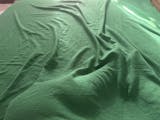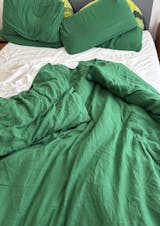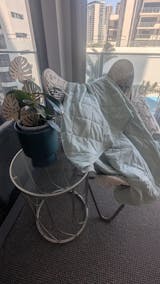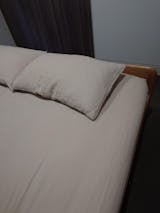Most people don’t think twice about their bedding. As long as it looks nice and feels soft at first touch, that’s usually enough.
But hidden beneath the surface, many synthetic sheets - often labelled as microfibre or polyester blends could be quietly undermining your sleep quality, skin health, and even your wallet.
If you’ve ever woken up hot, clammy, or itchy, it’s not you. It’s your sheets.
1. The Problem with Synthetic Bedding
Synthetic fibres are made from petroleum-based plastics such as polyester and nylon. While they can be cheap and easy to produce, they’re fundamentally different from natural fibres like cotton.
The biggest issue? They trap heat and moisture.
During the night, your body naturally releases heat and perspiration. Cotton absorbs and wicks that moisture away - synthetics don’t. They form a microclimate that gets progressively warmer and more humid as you sleep, leading to restless tossing and frequent wake-ups.
They’re also a false economy: while they cost less upfront, they pill, fade and lose softness faster, meaning you’ll likely replace them long before a good cotton set shows any signs of wear.
A 2020 CottonWorks® study found that cotton bedding retained 25% less heat overnight than comparable microfibre fabrics. That difference translates directly to better sleep quality and fewer interruptions through the night.
Learn more about our breathable bedding here.
2. Comfort That Comes Naturally
Cotton’s structure makes it naturally breathable. Its hollow fibres allow air to circulate freely and release trapped heat. When stonewashed - like our Caldera Collection - the fibres relax further, giving the fabric a beautifully soft, lived-in texture from the very first night.
Synthetic sheets, in contrast, can feel slippery or clingy, especially in warmer weather. They may mimic softness at first, but after a few washes that smooth coating breaks down, revealing a coarse, almost plastic feel.
Cotton gets softer with every wash. Stonewashed cotton starts there from day one.
3. Skin Health and Sensitivity
If you’ve ever woken up with redness, breakouts, or irritation, your bedding might be playing a role.
A 2019 study in the journal Dermatology and Therapy found that natural cotton fabrics supported faster skin barrier recovery compared to synthetic alternatives - particularly for people with eczema or sensitive skin. The breathability and moisture-regulating nature of cotton reduces the risk of bacterial growth, keeping your skin clearer and calmer.
Every piece in our Stonewashed Cotton Range is OEKO-TEX® certified, meaning it’s free from harmful chemicals and gentle enough for everyday use.
4. The True Cost of “Cheap” Sheets
Synthetic bedding may seem like a bargain upfront, but the costs add up in ways that aren’t always visible.
-
Frequent replacement: Polyester fibres break down faster, leading to pilling, fading and thinning.
-
Environmental impact: Washing synthetic fabrics releases microplastics into waterways - a growing global concern.
-
Poor sleep quality: When your sleep suffers, everything else does too - focus, energy, and mood.
In contrast, a well-made cotton sheet set lasts for years. It looks better, feels better, and aligns with a more sustainable lifestyle.
5. A Lifestyle Shift Worth Making
Switching to cotton isn’t just about fabric, it’s about how you feel each morning.
Imagine sliding into sheets that breathe with you, that soften with time, that stay beautiful wash after wash.
That’s the quiet luxury of stonewashed cotton - comfort that endures, naturally.
If you’re ready to experience the difference, explore the Caldera Collection - crafted for modern comfort, lived-in warmth, and long-lasting quality.























